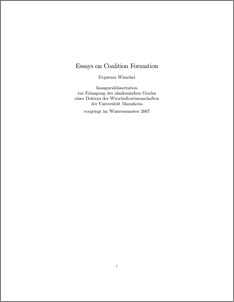|
Essays on coalition formation
Winschel, Evguenia
![[img]](https://madoc.bib.uni-mannheim.de/style/images/fileicons/application_pdf.png)  Vorschau |
|
PDF
winschel_thesis_corrected_5.pdf
- Veröffentlichte Version
Download (495kB)
|
|
URL:
|
https://madoc.bib.uni-mannheim.de/2045
|
|
URN:
|
urn:nbn:de:bsz:180-madoc-20457
|
|
Dokumenttyp:
|
Dissertation
|
|
Erscheinungsjahr:
|
2007
|
|
Titel einer Zeitschrift oder einer Reihe:
|
None
|
|
Ort der Veröffentlichung:
|
Mannheim
|
|
Hochschule:
|
Universität Mannheim
|
|
Gutachter:
|
Grüner, Hans Peter
|
|
Datum der mündl. Prüfung:
|
11 Dezember 2007
|
|
Sprache der Veröffentlichung:
|
Englisch
|
|
Einrichtung:
|
Fakultät für Rechtswissenschaft und Volkswirtschaftslehre > VWL, Wirtschaftspolitik (Grüner 1999-)
|
|
Fachgebiet:
|
320 Politik
|
|
Normierte Schlagwörter (SWD):
|
Koalition , Endogene Dynamik
|
|
Freie Schlagwörter (Englisch):
|
coalition formation , supermajority coalition , minimal winning coalition , endogenous default policy
|
|
Abstract:
|
In democratic countries economic decisions are made through the political process. Electoral results do not often generate a majority, which makes coalition politics crucial. The coalition formation and the bargaining inside the coalition directly influence a policy decision, given the election results. Who holds the government positions is one of the most important predictors of what policies will be adopted. In addition, expectations regarding potential future coalitions have an influence on the voters' choice at the election stage. The existing literature on bargaining in legislatures and coalition formation is abundant. Most of the studies generally assume that if decision makers do not reach a decision, it is postponed until the next period and a certain default policy is implemented. Two kinds of a default policy are generally considered: the policy that gives exogenous benefits to all decision makers or a stochastic default policy. However, the policy decisions usually have a prolonged effect and become the default policies in future legislations. Nevertheless, there exist only a few attempts to introduce an endogenous default policy in bargaining problems. The first three chapters of my dissertation consider the endogenous default policy. By the endogenous default policy I shall basically mean the situation when the default policy in the absence of a decision is determined by the policy last implemented. Furthermore, my dissertation considers the coalition size. Minimal winning coalitions (MWC) have appeared as a key prediction of various models of coalition formation and vote buying where the MWC is defined as the cheapest coalition which induces the acceptance. But as an empirical matter, supermajority coalitions appear at least as prevalent as minimal winning coalitions. I investigate conditions under which the MWC and supermajority coalitions emerge as an equilibrium outcome. Chapter 1 incorporates an endogenous default policy into the distribution model of legislative bargaining. For more than three risk neutral players, the stationary Markov perfect equilibrium yields a minimum winning coalition under congressional and parliamentary systems. The resulting equilibrium allocation will be generally more unequal than with the exogenous default policy. In Chapter 2 the endogenous and exogenous default policy rules are compared in the distribution model of legislative bargaining. If the initial default policy is symmetric, players are indifferent between the two rules. Players with a relatively high initial default payoff always support the endogenous default policy, which leads to an extreme allocation and cycling majorities. Players in the "middle" support the exogenous system, because they are always included into the coalition. Players with relative low initial default payoff favor the endogenous rule, if their default payoff is extremely low, and prefer the exogenous rule otherwise. If I allow for negative payments, players with an extremely low default payoff may change their preferences and support the exogenous system, which guarantees more stability. Moreover, if players decide about a policy rule by a simple majority voting, both rules can be chosen, depending on the initial allocation. As shown in Chapter 1, an endogenous default policy in the "divide the dollar" game leads to an extreme allocation when politicians are risk neutral. In Chapter 3 I show that if voters prefer more stability in the allocation, they can influence politicians via elections. This chapter shows that a symmetric allocation is obtained for a high enough discount rate if voters can reelect all politicians. If voters can elect only the agenda setter, only limited stability can be achieved. Maximal outcome stability requires political stability. Limited political competition can be introduced at the cost of the outcome stability. Chapter 4 studies coalition formation under asymmetric information. An outside party offers private transfers to members of a committee in order to influence its decision. The willingness to accept such transfers is private information. The paper demonstrates that a supermajority coalition induces truth-telling equilibrium and secures the implementation of the decision, desirable by an outside party, for a price close to the minimal winning coalition price.
|
|
Übersetzter Titel:
|
Essays zur Koalitionsformierung
(Deutsch)
|
|
Übersetzung des Abstracts:
|
Die ersten drei Kapitel meiner Dissertation diskutieren endogene Defaultentscheidungen im politischen Prozess. Mit dem Begriff der endogenen Defaultentscheidung bezeichne ich Situationen in denen, wenn keine Entscheidung zustande kommt, die letzte Entscheidung implementiert wird. Kapitel eins wendet die endogene Defaultentscheidung im Verteilungsmodell legislativer Verhandlungen an. Im zweiten Kapitel werden endogene und exogene Defaultentscheidungen im Verteilungsmodell legislativer Verhandlungen verglichen. Wie in Kapitel eins gezeigt, führen Defaultentscheidungen in Divide-the-Dollar Spielen bei risikoneutralen Politikern zu extremen Allokationen. In Kapitel drei zeige ich, dass wenn Wähler eine stabilere Allokation bevorzugen, sie Politiker durch Wahlen beeinflussen können. Darüberhinaus untersucht meine Dissertation die Größe von Koalitionen. Kapitel vier untersucht die Koalitionsformierung unter asymmetrischer Information. Dieses Papier zeigt, dass eine Supermehrheitskoalition ein Gleichgewicht induziert, bei dem die Agenten ihren wahren Typen offenbaren.
(Deutsch)
|
 | Dieser Eintrag ist Teil der Universitätsbibliographie. |
 | Das Dokument wird vom Publikationsserver der Universitätsbibliothek Mannheim bereitgestellt. |
 Suche Autoren in Suche Autoren in
Sie haben einen Fehler gefunden? Teilen Sie uns Ihren Korrekturwunsch bitte hier mit: E-Mail
Actions (login required)
 |
Eintrag anzeigen |
|
